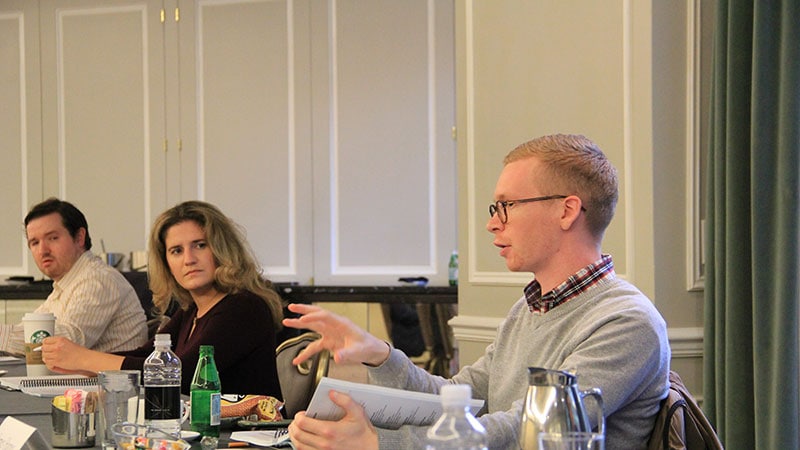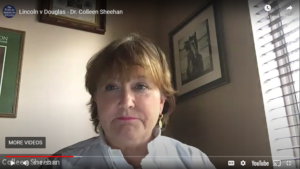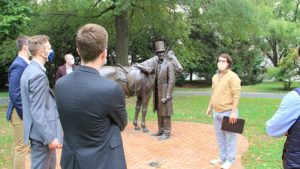
This year’s Public Policy Fellows are studying the concepts and principles fundamental to the American Founding. Each month, TFAS hosts the cohort of 17 young professionals in D.C. for educational seminars related to “The Experiment in Self-Government.”
Dr. Sheehan and the Public Policy Fellows really brought the issues at stake in the Lincoln-Douglas Debates to life and set them in the context of today’s pressing political and cultural issues.” – Michael Turchetti, PPF ’20
November presented the Fellows with an opportunity to expound on what they learned during their October retreat at President Lincoln’s Cottage and learn about the principles on which our nation was founded through the medium of the Lincoln-Douglas Debates. The Fellows also explored the concepts of popular sovereignty and equality by analyzing their prevalence throughout history. They considered which of those two ideas has guided U.S. leaders by engaging in a lecture and discussion with Dr. Colleen Sheehan.

Dr. Sheehan is the Director of Graduate Studies and a professor at the School of Civic and Economic Thought and Leadership at Arizona State University. As an American Founding expert, she has led TFAS Public Policy Fellowship lectures on the Lincoln-Douglas Debates for several years, but due to travel restrictions, Sheehan appeared via video to meet with this year’s Fellows.
Brenda Hafera, Director of International and Continuing Education Programs at TFAS, noted that Sheehan’s remarks provided an insightful look into the difficult decisions facing the nation during the 1800’s and are still relevant today.
“Sheehan asked Fellows to consider Stephen Douglas’ proposition that popular sovereignty – that decisions are a matter of mere majority rule and the force of will – is the highest principle in a republic,” Hafera explained. “She challenged the Fellows to identify a principle that holds supremacy if they wanted to argue that Douglas was incorrect.”
During the lecture, Sheehan shared how Lincoln believed the concept that ‘all men are created equal,’ not popular sovereignty, should be the governing standard of the U.S., and that therefore slavery was an aberration. However, he did not abolish slavery in the states, only the territories. Sheehan asked Fellows to consider the reasons for Lincoln’s actions and the role of statesmanship in bringing about the implementation of policies that coincide with natural justice.
As one Fellow noted, the discussion challenged them to contemplate the subject with greater attentiveness than they had in years.

Tom Savidge, PPF ’20, a research manager of the Center for State Fiscal Reform at the American Legislative Exchange Council, said the discussion gave him a broader perspective on this pivotal period in American history.
“Truth be told, the last time I had read about Lincoln v. Douglas was in high school,” Savidge shared. “It was refreshing to take part in a discussion of ideas, especially on the topic of the Lincoln-Douglas Debates. It was great to come back to this topic with a fresh perspective.”
Another Fellow, Michael Turchetti, PPF ’20, a director of health policy at the Pharmaceutical Research and Manufacturers of America (PhRMA), said he was most fascinated by the fact that the historical lessons of the seminar proved to be relevant to our nation’s present culture.
“As a lover of American history who rarely has time to read about it, or even more importantly, reflect on how questions facing our political forefathers are still relevant today, it was invigorating to engage with and discuss the primary texts of Stephen Douglas and Abraham Lincoln,” Turchetti said. “Dr. Sheehan and the Public Policy Fellows really brought the issues at stake in the Lincoln-Douglas Debates to life and set them in the context of today’s pressing political and cultural issues.”
The Fellows will continue to meet once per month to engage in additional seminars, lectures, and discussion sessions surrounding “The Experiment in Self-Government.” To learn more about the Fellowship and meet the 2020-21 cohort, visit TFAS.org/PPF20.

